Daily Vocabulary Words: List of Daily Used Words in Leading International Newspapers
Hi there. Welcome to this special section @ Wordpandit.
Our endeavour here is very simple: to highlight important daily vocabulary words, which you would come across in leading newspapers in the country. We have included the following newspapers in our selection:
• The New York Times
• The Washington Post
• Scientific American
• BBC
• The Guardian
• Psychology Today
• Wall Street Journal
• The Economist
We are putting in extensive work for developing your vocabulary. All you have got to do is be regular with this section and check out this post on a daily basis. This is your repository of words that are commonly used and essentially, we are posting a list of daily used words. Hence, this has significant practical application as it teaches you words that are used commonly in leading publications mentioned above.
Visit the website daily to learn words from leading international newspapers.
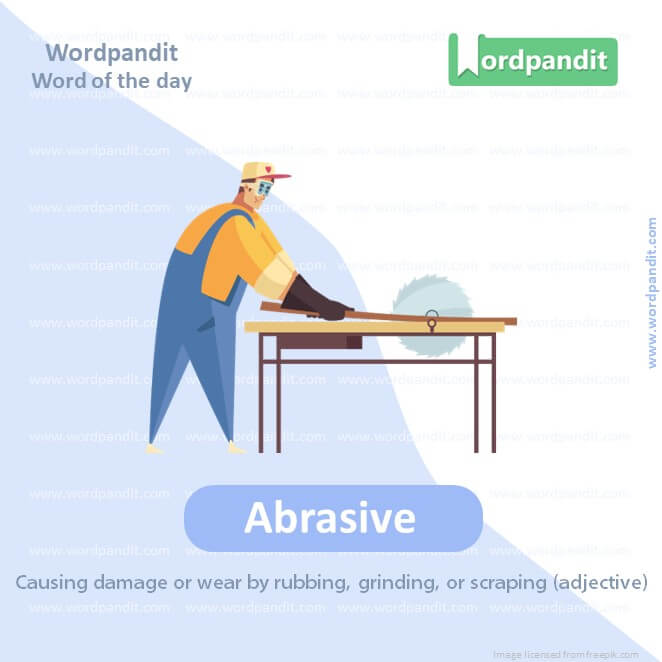
WORD-1: Abrasive
CONTEXT: Democracy are served like a comforting bowl of grits and a glass of sweet tea. He is not abrasive. He is likable.
SOURCE: Washington Post
EXPLANATORY PARAGRAPH: Imagine if you had a rough piece of sandpaper and you rubbed it against your skin. It would feel scratchy, right? That scratchy feeling is what we call “abrasive”. When we talk about a person being abrasive, we mean that they are a little rough around the edges, maybe not very friendly or too direct.
MEANING: Causing damage or wear by rubbing, grinding, or scraping (adjective). Harsh or rough in manner (adjective).
PRONUNCIATION: ah-BRAY-siv
SYNONYMS: Scratchy, Harsh, Grating, Rasping, Gritty, Coarse, Rough
USAGE EXAMPLES:
1. The abrasive cleaner scratched the surface of the delicate glass.
2. He had an abrasive personality, always speaking without thinking.
3. Sandpaper has an abrasive surface that’s used for smoothing things down.
4. Her abrasive remarks at the meeting left everyone feeling uncomfortable.
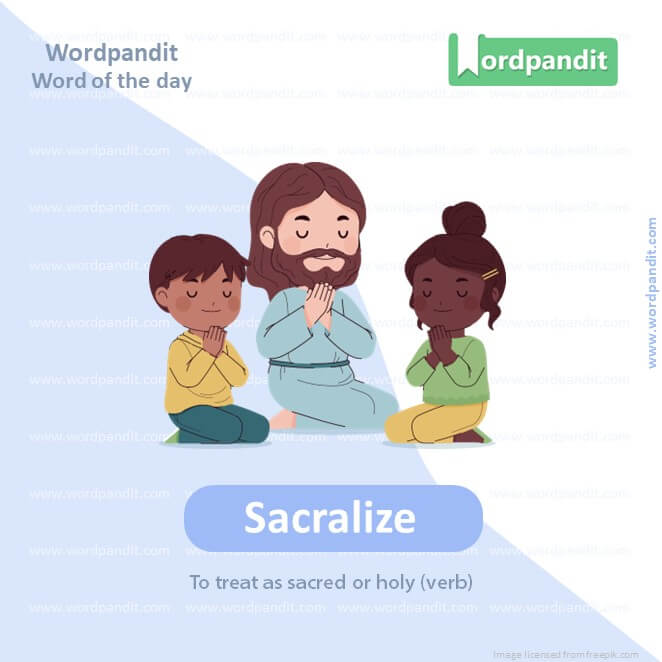
WORD-2: Sacralize
CONTEXT: As Peter Wehner wrote for The Atlantic, Johnson “uses his Christian faith to sacralize his fanaticism and assault on truth.
SOURCE: Al Jazeera
EXPLANATORY PARAGRAPH: Have you ever seen something that people treat with a lot of respect, almost like it’s special or magical? When people make something very, very special, it’s like they “sacralize” it.
MEANING: To treat as sacred or holy (verb).
PRONUNCIATION: SAY-kruh-lyze
SYNONYMS: Consecrate, Sanctify, Hallow, Venerate, Bless, Exalt
USAGE EXAMPLES:
1. They chose to sacralize the ancient tree, believing it had spiritual powers.
2. The community decided to sacralize the ground where the battle took place.
3. Ceremonies are a way to sacralize important moments in our lives.
4. Some traditions sacralize objects to give them religious significance.
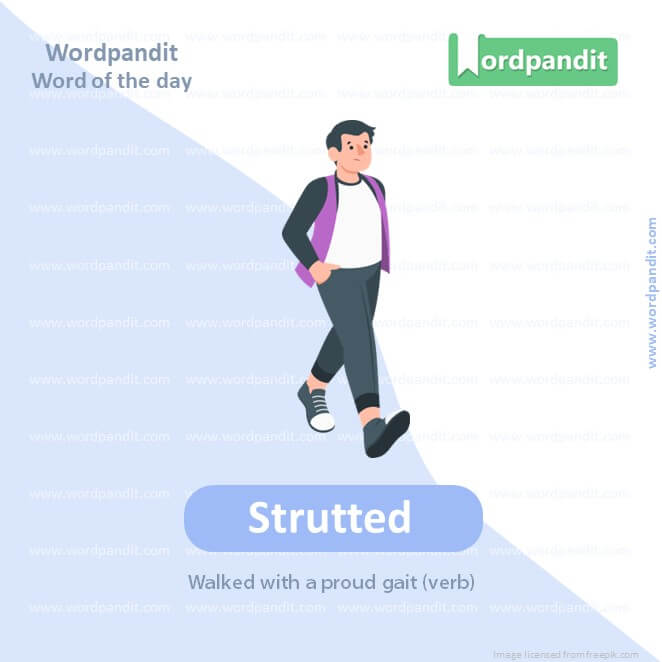
WORD-3: Strutted
CONTEXT: The macho culture of the Downing Street in which they strutted their stuff was a disgrace.
SOURCE: Al Jazeera
EXPLANATORY PARAGRAPH: Imagine you see a peacock spreading its feathers and walking proudly. That walk, full of pride and confidence, is called “strutting”. So, when someone walks like they’re very proud, they’ve “strutted”.
MEANING: Walked with a proud gait (verb).
PRONUNCIATION: struh-TED
SYNONYMS: Swaggered, Paraded, Flaunted, Pranced, Sashayed, Marched, Preened
USAGE EXAMPLES:
1. He strutted around the room after winning the award.
2. The models strutted down the runway in the latest fashions.
3. She strutted into the party, turning all heads towards her.
4. The rooster strutted across the yard, showing off to the hens.
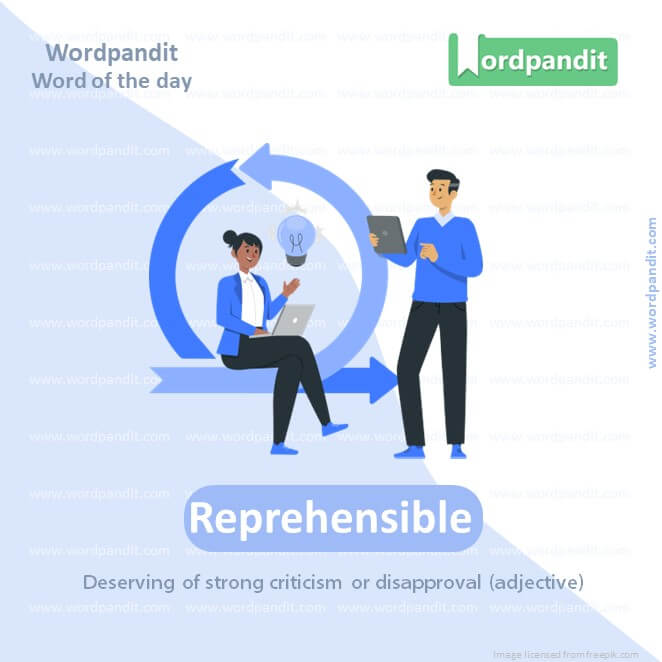
WORD-4: Reprehensible
CONTEXT: Focusing too much on the individuals who were faced with making pandemic policy decisions, understandable though that is and reprehensible though many of them proved, risks missing the larger picture that will matter more for the future.
SOURCE: Guardian
EXPLANATORY PARAGRAPH: Think of something that is really, really not good. Like when someone does something very naughty, and everyone thinks they shouldn’t have done it. That action is called “reprehensible”.
MEANING: Deserving of strong criticism or disapproval (adjective).
PRONUNCIATION: rep-ri-HEN-suh-bul
SYNONYMS: Shameful, Disgraceful, Despicable, Deplorable, Ignominious, Blameworthy, Scandalous
USAGE EXAMPLES:
1. Stealing from a friend is a reprehensible act.
2. The coach’s behavior towards the team was reprehensible and unacceptable.
3. Many found his comments to be reprehensible and offensive.
4. It’s reprehensible to lie just to save oneself from trouble.
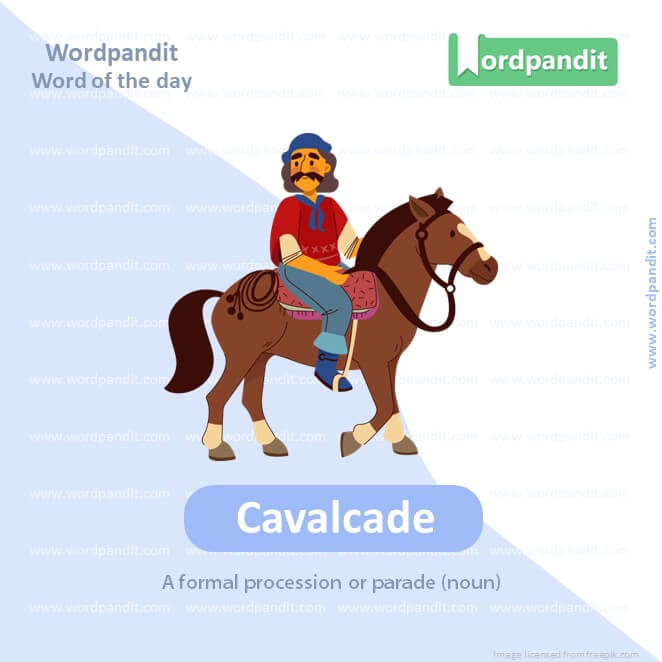
WORD-5: Cavalcade
CONTEXT: The only thing this cavalcade of know-alls didn’t seem to know is the first thing about themselves.
SOURCE: New York Times
EXPLANATORY PARAGRAPH: Imagine you see a big line of cars, horses, or people moving together in a parade. This special line or procession is called a “cavalcade”.
MEANING: A formal procession or parade (noun).
PRONUNCIATION: KAV-uhl-kayd
SYNONYMS: Parade, Procession, Caravan, Motorcade, Train, March
USAGE EXAMPLES:
1. The townspeople watched the cavalcade of soldiers march through the streets.
2. A cavalcade of antique cars drove through the town during the festival.
3. The royal cavalcade was a sight to behold, with golden carriages and horses.
4. Every year, the school organizes a cavalcade to celebrate its founding day.
WORD-6: Surrogates
CONTEXT: Israel and its surrogates have stepped up attempts to silence journalists who express pro-Palestine or balanced and historically contextualised views.
SOURCE: New York Times
EXPLANATORY PARAGRAPH: Imagine if you had a toy, but you lost it, and your friend lent you a similar toy to play with for a while. That toy your friend gave you is like a “surrogate” – it’s standing in place of the one you lost. Surrogates can be people or things that act or serve in place of someone or something else.
MEANING: People or things that act or serve in place of someone or something else (noun).
PRONUNCIATION: SUR-uh-gates
SYNONYMS: Substitutes, Replacements, Stand-ins, Proxies, Deputies, Alternates, Backups
USAGE EXAMPLES:
1. After the queen bee died, a surrogate was chosen to take her place.
2. When the mayor was sick, his deputy acted as a surrogate at the meeting.
3. Some couples, unable to have children, seek surrogates to carry their babies.
4. The understudy is a surrogate for the main actor if they can’t perform.
WORD-7: Appendage
CONTEXT: The Palestinians are merely an appendage to this story.
SOURCE: Washington Post
EXPLANATORY PARAGRAPH: Think of your hand as something that’s attached to your arm. It’s like an extra part, isn’t it? An “appendage” is like that – an extra part that’s attached to something bigger.
MEANING: A part that is joined to something larger (noun).
PRONUNCIATION: uh-PEN-dij
SYNONYMS: Attachment, Extension, Limb, Offshoot, Protrusion, Addition, Extremity
USAGE EXAMPLES:
1. The tail is an important appendage for many animals.
2. The small room that was built later is an appendage to the main house.
3. Fish use their fin appendages to swim in the water.
4. The robot’s appendage allowed it to pick up objects.
WORD-8: Intimidation
CONTEXT: There has also been a pushback against the pressure and intimidation campaigns targeting pro-Palestine voices.
SOURCE: New York Times
EXPLANATORY PARAGRAPH: Have you ever felt scared because someone was trying to bully or threaten you? That scary feeling you get because of their threats or bullying is called “intimidation”.
MEANING: The act of frightening or threatening someone, usually to get them to do something (noun).
PRONUNCIATION: in-tim-ih-DAY-shun
SYNONYMS: Bullying, Coercion, Threatening, Terrorizing, Menacing, Pressuring, Scaring
USAGE EXAMPLES:
1. The teacher noticed the intimidation among students and took immediate action.
2. Intimidation is not an effective leadership strategy.
3. She faced intimidation from her colleagues because of her different views.
4. The gang’s main tactic was intimidation, forcing local businesses to pay them.
WORD-9: Stigmatisation
CONTEXT: Muslim women have long been forced to manoeuvre a triple bind to avoid discrimination, harassment and stigmatisation.
SOURCE: Guardian
EXPLANATORY PARAGRAPH: Imagine if someone drew a mark on your face because you liked a different flavor of ice-cream. It wouldn’t be fair, right? “Stigmatisation” is like that mark. It’s when people treat someone badly or unfairly because they are different or have a problem.
MEANING: The action of treating someone unfairly by publicly disapproving of them (noun).
PRONUNCIATION: stig-muh-ti-ZAY-shun
SYNONYMS: Disgrace, Branding, Labeling, Marking, Shaming, Denunciation, Blacklisting
USAGE EXAMPLES:
1. The stigmatisation of mental health issues prevents many from seeking help.
2. Society’s stigmatisation of certain behaviors can lead to social isolation.
3. She felt the stigmatisation from her community after the scandal.
4. The media plays a role in the stigmatisation of certain groups.
WORD-10: Depoliticised
CONTEXT: A “good Muslim woman” is simultaneously infantilised and patronised, vilified and censored, and depoliticised in a society that is incapable of seeing her as a smart, independent, strong female leader.
SOURCE: Guardian
EXPLANATORY PARAGRAPH: Imagine you have a toy box filled with toys of different shapes and colors. Now, if you took out all the toys that looked like they could be used in a game about rulers and kingdoms, your toy box would be “depoliticised” – meaning it doesn’t have anything to do with politics or rulers anymore.
MEANING: Made neutral, non-political, or not influenced by political considerations (verb).
PRONUNCIATION: dee-POL-i-ti-sized
SYNONYMS: Neutralized, Unbiased, Nonpartisan, Impartial, Unprejudiced, Even-handed, Detached
USAGE EXAMPLES:
1. The organization was depoliticised to ensure that everyone felt welcome.
2. They aimed to create a depoliticised zone where all parties could discuss peacefully.
3. After years of political influence, the committee was finally depoliticised.
4. To encourage wider participation, the event was completely depoliticised.
Vocabulary Today
In the dynamically evolving spectrum of language, staying updated with ‘vocabulary today’ is an integral part of mastering a language. These topical, contemporary words breathe vitality into our communication, bridging the gap between language learning and language living. But, how can we effectively learn ‘vocabulary today’?
Grasping ‘vocabulary today’ begins with exposure to contemporary contents. Engaging with current publications, social media platforms, movies, music, podcasts, and digital content can dive you into the real-world usage of ‘vocabulary today’. These platforms imbibe the vocabulary of the day, reflecting the evolution in language.
To consolidate the learning of ‘vocabulary today’, utilize memory-enhancing tools. Flashcards, language learning apps, or memory-enhancement software can make your study session an engaging venture and enhance word retention.
However, the secret sauce to learning ‘vocabulary today’ is practice. Inculcating these words in your regular dialogues, written correspondences, or social media posts will reinforce your grasp over these words. It brings you closer to ‘vocabulary today’, enhancing your language adaptability and fluency.
Better understanding of ‘vocabulary today’ can be achieved by staying connected with diverse social platforms which bring words from across locations and cultures, expanding your linguistic understanding. Also, participating in language forums, discussion groups, or language exchange platforms provides great insights into ‘vocabulary today’.
In the final analysis, staying abreast with ‘vocabulary today’ is an exciting quest that requires consistent exposure, active practice, and social engagement. As you embrace this journey, you will find your language proficiency growing with every new word, enabling you to step into the dynamic world of contemporary language with confidence and mastery. Remember, ‘vocabulary today’ is not static, it flows like a river, always fresh, always changing, and always enriching!









